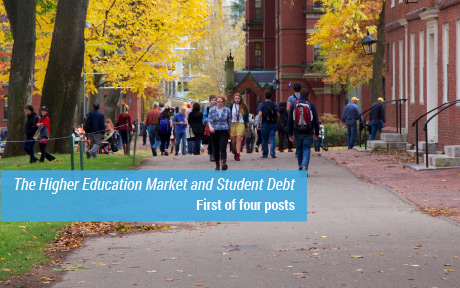Hey, Economist! Is Now a Good Time to Be Graduating from College?

A Conversation with Jaison R. Abel and Richard Deitz With the 2017 college graduation season in full swing, we thought it would be helpful to take stock of the job prospects for recent college graduates. Is now a good time to be graduating from college? Publications editor Trevor Delaney caught up with Jaison Abel and […]
Diplomas to Doorsteps: Education, Student Debt, and Homeownership
At the N.Y. Fed: Press Briefing on Household Borrowing with Close‑Up on Student Debt

An examination of recent developments in household borrowing was the focus of a press briefing held this morning at the New York Fed.
Who Falters at Student Loan Payback Time?
This is the final post in a four-part series examining the evolution of enrollment, student loans, graduation and default in the higher education market over the course of the past fifteen years.
The Changing Role of Community‑College and For‑Profit‑College Borrowers in the Student Loan Market
In the first post in this series, we characterized the rapid transformation of the higher education market over the 2000-2015 period, a transformation that was led by explosive growth of the for-profit sector of higher education.
The Changing Higher Education Landscape
Just Released: New Web Feature Provides Timely Data on the Job Market for Recent College Graduates
Jaison R. Abel and Richard Deitz Many newly minted college graduates entering the labor market in the wake of the Great Recession have had a tough time finding good jobs. But just how difficult has it been, and are things getting better? And for which graduates? These questions can be difficult to answer because timely […]
Trends in Debt Concentration in the United States By Income
Household debt in the United States expanded before the Great Recession, contracted afterward, and has been recovering since 2013.
The Class of 2015 Might Have a Little Better Luck Finding a Good Job
With the college graduation season well under way, a new crop of freshly minted graduates is entering the job market and many bright young minds are hoping to land a good first job. It’s no wonder if they are approaching the job hunt with some trepidation. For a number of years now, recent college graduates have been struggling to find good jobs. However, the labor market for college graduates is improving. After declining for nearly two years, openings for jobs requiring a college degree have picked up since last summer. Not only has this increase in the demand for educated workers continued to push down the unemployment rate for recent graduates, but it has also finally started to help reduce underemployment, though the underemployment rate remains high. While successfully navigating the job market will likely remain a challenge, it appears that finding a good job has become just a little bit easier for the class of 2015.
Just Released: Press Briefing on Student Loan Borrowing and Repayment Trends, 2015
This morning, Jamie McAndrews, the Director of Research at the Federal Reserve Bank of New York, spoke to the press about the economic recovery, and his speech was followed by a special briefing by New York Fed economists on student loans. Here, we provide a short summary of the student loan briefing.
















 RSS Feed
RSS Feed Follow Liberty Street Economics
Follow Liberty Street Economics